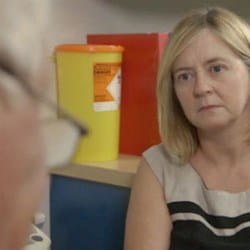BACKGROUND: Mr S, 68, has been seeking treatment for osteoarthritis for more than six years. In the past two years the condition has worsened, causing considerable pain in his back and legs. During that time, his GP Dr B has prescribed 10mg morphine sulphate tablets (MST) – two pills to be taken twice daily.
Mr S visits the practice for a repeat prescription and the request is dealt with by Dr N who then handwrites out a prescription for 100mg MST, two tablets twice daily. Mr S fills the prescription at the pharmacy and proceeds to take two tablets before going to bed. He wakes up during the night feeling unwell and is violently sick the next morning. His wife calls for an ambulance but he is pronounced dead in his home a short time later.
Several months later, a claim of clinical negligence is lodged by Mrs S against Dr N accusing him of causing or contributing to the death of her husband and seeking payment of damages. A claim is also lodged on the grounds of vicarious liability against Dr N’s two fellow GP practice partners as well as against the pharmacist who failed to spot the dosage error. Dr N and his partners are MDDUS members and seek advice on how to proceed.
ANALYSIS/OUTCOME: MDDUS asks Dr N for his account of the events surrounding the repeat prescription issued to Mr S. He explains that he had been under considerable pressure in the practice that day and was struggling to work through a large number of patient requests for repeat prescriptions. He admits that, while the printed repeat prescription request was for the correct dosage, he made an error when copying the information by hand onto the prescription itself. He adds that he has also since apologised in a phone call to Mrs S.
MDDUS instructs an expert opinion from a cardiologist regarding how Mr S died. Its findings are considered alongside the official cause of death which is stated as coronary artery disease but with the vomiting induced by the high dose of morphine acting as a contributing factor.
Following discussions with Dr N, MDDUS informs representatives of Mrs S that Dr N accepts liability in Mr S’s death but it is disputed that Dr N’s error caused Mr S’s death. After further lengthy legal discussions, MDDUS agrees a settlement with Mrs S for a sum of compensation, the cost of which is partly shared with the National Pharmacy Association, representatives of the pharmacist who dispensed the MST.
Key points
- Have a low threshold for double-checking prescriptions when dealing with high-risk drugs, particularly dosage calculations.
- Encourage a good level of knowledge and understanding of medicines in patients, particularly those with conditions such as epilepsy, coronary heart disease with angina, diabetes mellitus and heart failure.
This page was correct at the time of publication. Any guidance is intended as general guidance for members only. If you are a member and need specific advice relating to your own circumstances, please contact one of our advisers.
Save this article
Save this article to a list of favourite articles which members can access in their account.
Save to library


